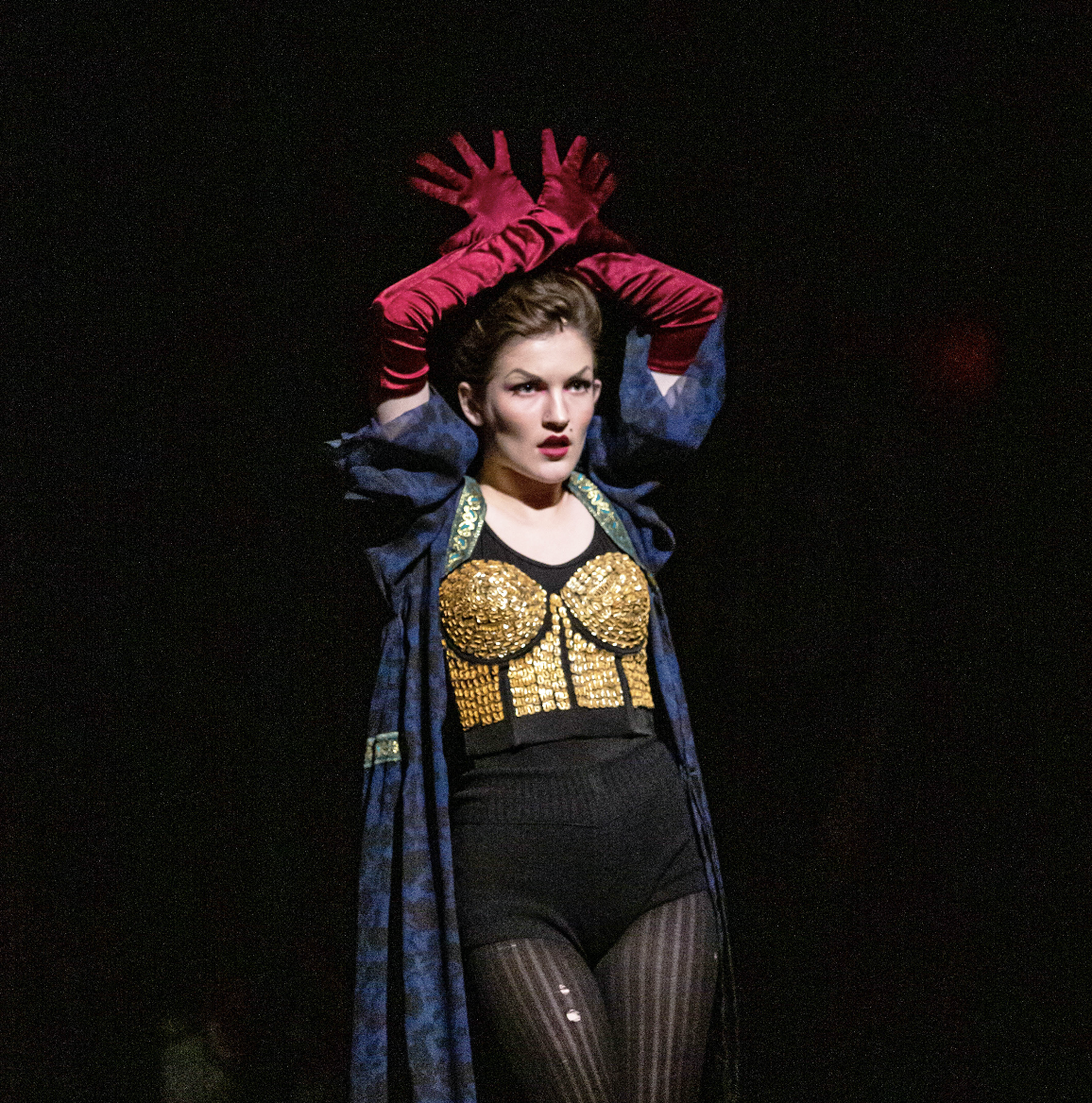
For Walker Caplan ’20, writing plays, acting and performing stand-up comedy are all, really, the same thing: surprising the audience and forcing each spectator to reconsider themselves.
“The punchline of a joke is a reveal,” Caplan said. “It’s a pop of clarity that lets us see the setup in a new way. It lets us in on a truth about us or our world, so we laugh. Surprise and recognition.”
According to Caplan, plays also expose these truths. They expose what audiences aren’t actively thinking about, and thus, aren’t yet able to articulate.
“Acting is the same,” Caplan said. “It’s a project of empathy, of recognizing yourself in a character and simultaneously imagining your potential for extremes, your potential beyond the self you identify with.”
Caplan is currently working on a new play with the working title “THE HOLE,” which will serve as her thesis in the writing concentration of the English major. The play is about two couples caught in a multi-level marketing scheme. While writing “THE HOLE,” she is overseeing the production of her newest play, “WINNERS.” The show follows students at Forest Ridge Middle School as they reckon with the death of a yo-yo prodigy and prepare for the school’s talent show.
Other recent works of hers include two joint projects with composer-lyricist Scott Etan Feiner ’20: “SATURDAYS,” which received readings and workshops at the New York Musical Festival as well as at Signature Theatre through its fellowship with the Shen Curriculum; and “RUMSPRINGA,” a play that follows an Amish girl as she embarks on a traditional rite of passage.
When brainstorming, Caplan likes to employ “automatic writing,” which she described as “the regular process of simply writing without stopping or editing for five to seven minutes at a time.” This approach, championed by Yale playwriting professor Deb Margolin, is meant to allow thoughts churning beneath the surface of one’s mind to emerge.
Chikezie Nwachukwu ’20, who plays a character named Danny in “WINNERS,” said Walker oscillates between two personas while watching rehearsals of her plays — she gazes at the production with rapt attention and “savant-like” seriousness, and then, suddenly, returns to her usual warm self. Nwachukwu also said he often catches Caplan in surprise during rehearsal — eyes wide, totally surprised by what she has written and read dozens of times.
Nwachukwu also called Caplan’s comedy performance “electric,” saying that when she does physical comedy, she moves her body in ways he did not even know were possible.
Isaac Scobey-Thal ’20 plays the prodigy’s other best friend, Tug. He said he was completely seduced by “WINNERS” the moment he read Tug’s audition part: a monologue he found both hilarious and heartbreaking. In contrast with “RUMSPRINGA,” Scobey-Thal said he feels Caplan let completely loose when writing “WINNERS.”
Professor Ryan Wepler, who taught Walker in his Writing Humor course last semester, described her humor as “surreal, but also satirical,” adding that she has the ability to make the strangest jokes appear important. Wepler also said that Walker is deeply attentive to the weight of every word she uses. This, in Wepler’s opinion, is what makes her humor so effective.
Wepler and Scobey-Thal, though exposed to two different spheres of her artistic career, both emphasized her originality in both subject matter and execution.
“Her sense of humor is really, really distinctive. It’s uncommonly distinctive,” said Wepler, noting that this makes her writing fresh. “She can craft these sentences that have very strange language patterns in them.”
Walker often writes for The Yale Record, a campus humor magazine. Caleb Cohen ’21, the publication’s editor-in-chief, said that Walker often chooses topics that others do not conventionally find funny. She works with these topics until they yield the perplexing, bizarre jokes Wepler described. Cohen remarked that even Caplan’s tweets are “just kind of ridiculous” and contain her distinctive comedic voice. Cohen first met Walker when they worked on comedy together within “Tilting at Windmills,” a college political satire show that Caplan helped found and has since retired from.
The distinctiveness of Caplan’s humor has occasionally rendered relatively mainstream groups less willing to publish her writing. Wepler said that he feels the comedic voice she uses in many of her pieces does not “align with the McSweeney’s or the New Yorker’s voice, or the voice on any of these sites.”
Last summer, Caplan interned with Reductress, a satire website that parodies media outlets intended for female audiences. The publication rejected a number of Walker’s wilder pieces, and Wepler presumes the site simply regarded them as deviating too much from standard written comedy. Caplan’s Reductress work ranges from articles in which she ironically raves about products marketed to women — “5 Fit-and-Flare Dresses That Say ‘My Ass is a Cone’” and “Cute Pride Flags To Conceal Your Boyfriend During Pride Month” — to posts in which she mocks men’s less desirable qualities — “My Boyfriend May Be Short, But He’s Also Loud.” One of her pieces is simply a photo of a metallic green beetle with the headline “Wow! This Bug is Femme.”
But at the end of the day, Caplan hardly differentiates between her raunchy, satirical pieces and a play about middle school tragedy like “WINNERS.”
“Jokes are like little plays,” Caplan said. “Plays are huge jokes. Acting is telling a story which is like telling a joke. Telling a joke is playing a trick which is like acting. It’s all the same.”
Caplan is from Seattle, Washington.
Annie Radillo | annie.radillo@yale.edu







